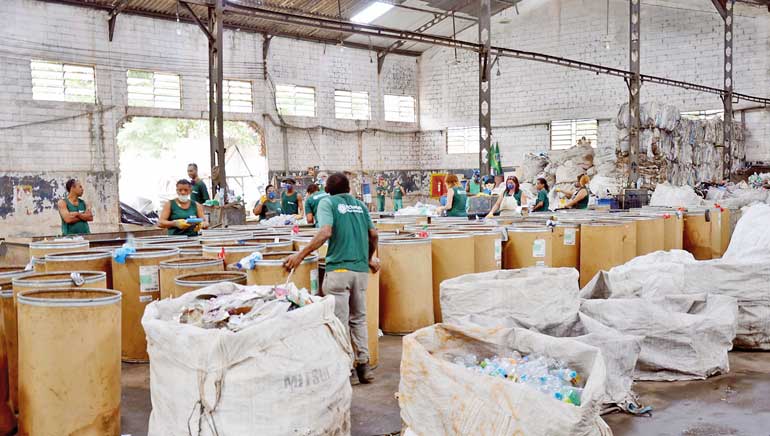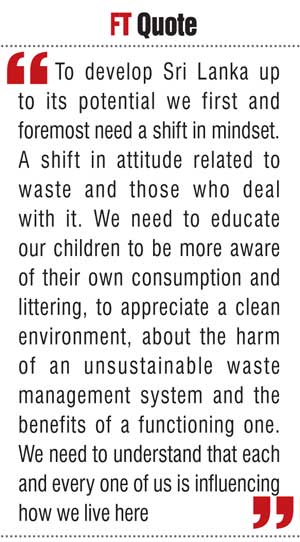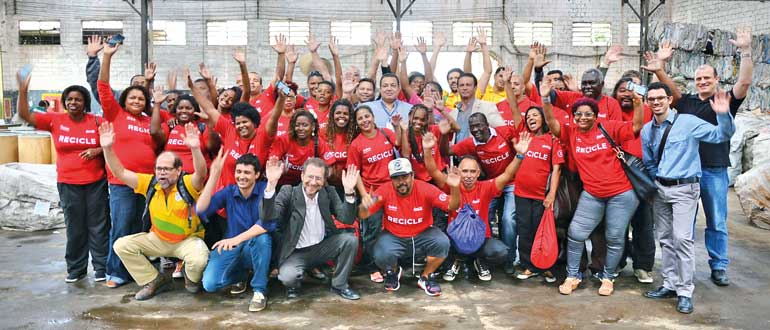Monday Feb 16, 2026
Monday Feb 16, 2026
Wednesday, 10 August 2016 00:00 - - {{hitsCtrl.values.hits}}
 Ecco Ponto co-operative’s depot, where Rio 2016’s waste pickers will sort through recyclable goods from the Games
Ecco Ponto co-operative’s depot, where Rio 2016’s waste pickers will sort through recyclable goods from the Games
 Despite the controversies associated with the Rio 2016 Olympics, some news seem promising.
Despite the controversies associated with the Rio 2016 Olympics, some news seem promising.
Recently the Guardian Newspaper has shared an article on the experiences of Brazilian waste pickers who faced severe stigma due to their occupation before being formally contracted to handle recyclable waste during the Olympic Games 2016 within a program started by Rio 2016, a large corporate and the Brazilian Government. They now earn more than double per day in addition to their share from the sale of the recyclable goods.
Hiring the waste pickers cost the organisers the same as hiring a private cleaning business, however with a much great social benefit. It is estimated that the pickers would be handling not less than 3,500 tons of recyclables over the course of the games.
In neighbouring India, occupations related to waste are still linked to stigma where even the envisioned profit from recycling or waste to energy cannot convince many businesses to engage in this sector, therefore being a barrier to innovative waste management solutions which India desperately needs.
In Sri Lanka we have a number of waste pickers who are sometimes independent and sometimes linked to the CMC or private companies. Where the corporate side of the waste management system seems respected, the waste pickers themselves face a similar situation as their counterparts in other countries. Their services are hardly recognised. Their contribution to less landfill (when segregating the recyclable items from the rest) and clean roads and public spaces is not sufficiently appreciated – yet no one of us would want to imagine a Sri Lanka without waste collectors.
Some weeks back I have visited a kids’ movie premiere in one of the renowned Colombo cinemas which was very well attended, by children and parents. After the movie finished and visitors left, the auditorium was covered in waste. Milk and juice was spilled on seats and the entire floor between the rows was filled with packaging, food and drink items. The carelessness of the visitors was shocking.
What about the educational effect on the children, who learn from small age onwards that littering in such a way is actually ok? That we have the “right to litter” to which extent we feel and someone else will come and clean it up anyways? That it is actually a part of entertainment and events to litter. The cinema cleaning team despite their efforts was not able to clean the venue until the next movie started.
It happens in each country that some people couldn’t care less about a clean environment; however the degree of littering and unsustainable waste management practices in Sri Lanka is shockingly high. Each spot where buses and vans hold for lunch breaks or people gather, even along the roads where intercity buses run, a vast amount of litter can be found. Why is that?
 Sometimes there might not be bins available at certain places especially outside the cities, however instead of throwing the garbage on the ground or into the sea, why not keeping a bag and taking it to the next bin (as it is practiced in other countries)? One person’s litter can be easily taken, however as soon as even a small amount is disposed into the nature, other people see the spot as dumping ground and they continue to add their litter.
Sometimes there might not be bins available at certain places especially outside the cities, however instead of throwing the garbage on the ground or into the sea, why not keeping a bag and taking it to the next bin (as it is practiced in other countries)? One person’s litter can be easily taken, however as soon as even a small amount is disposed into the nature, other people see the spot as dumping ground and they continue to add their litter.
It seems that it is self-understood that someone else comes and cleans our dirt. And if not, it also doesn’t matter much, because we will then burn it or dump it somewhere where we can’t see it anymore – neglecting the fact that our waste behaviour is already backfiring on us – be it via the ground water, the soil and vegetables as well as animals we consume or air pollution.
In Sri Lanka we are very particular about what we are and foremost what we are not – an employee at an office or shop will rarely bend to pick up a piece of litter on the ground, the cleaning person needs to come to pick it up. We are too “good” for it.
Talking to officials within waste management organisations reveals that it is the prevailing opinion of residents that the sole responsibility for waste management lies with the respective organisations; even educational and awareness raising efforts to include the citizens in keeping our country clean fail due to this widespread attitude. Still, complaining and sometimes drowning in waste is perceived better than becoming active ourselves.
It is self-understood that each country needs a comprehensive waste management system which includes primarily government, private companies and civil society organisations. However a successful waste management system is heavily dependent on the contribution of each and every citizen starting from consumption patterns, ending with disposal behaviour.
In other countries, citizens are fined for not segregating or for littering. There is one way of introducing and executing strict laws, there is another one to increase the understanding of the harm of unsustainable waste disposal for each and every one, and the benefits of a sustainable system.
To develop Sri Lanka up to its potential we first and foremost need a shift in mindset. A shift in attitude related to waste and those who deal with it. We need to educate our children to be more aware of their own consumption and littering, to appreciate a clean environment, about the harm of an unsustainable waste management system and the benefits of a functioning one. We need to understand that each and every one of us is influencing how we live here.
Where it is the main responsibility of organisations to set up a solid system, we also have to contribute to it: in terms of segregation, recycling, not littering on roads, parks and other public spaces or less consumption overall. It is a bit of a chicken and egg situation; who needs to start – organisations or consumers? Truth is both! There will be only change if we understand our own responsibility as consumers and as citizens.
Sri Lanka is one of the most beautiful and bio-diverse countries in Asia, if not globally, including extensive fauna and flora which is admired by those living here and those visiting. It is not only our human nature to live atone with a healthy environment, it is also our duty as citizens to contribute to a clean and zero-waste Sri Lanka. If others can do it, why not us?

Rio 2016’s waste pickers